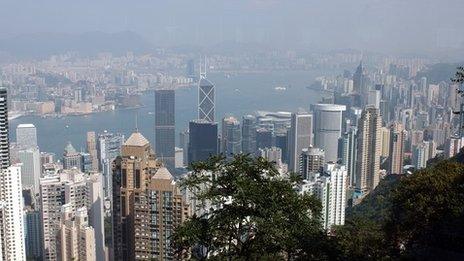RBS fined £460,000 over illegal emerging market trades
- Published

Royal Bank of Scotland (RBS) has been fined HK$6m (£460,000) by Hong Kong regulators after it failed to detect a series of unauthorised transactions by one of its traders.
The fine follows the conviction of former RBS trader, Shirlina Tsang, for fraud last year.
She was sentenced to 50 months in prison after being caught falsifying records of emerging markets trades.
Hong Kong regulators said RBS's controls were "seriously inadequate".
The Securities and Futures Commission (SFC) also said there were "significant weaknesses in its procedures, management systems and internal controls."
Swift action
But the regulator said the fine took into account the bank's speedy action in alerting the authorities once it had discovered the illegal trades, which took place in its emerging markets rates business in 2011.
"This deserves substantial credit and is the reason why today's sanctions are not heavier ones," Mark Steward, the SFC's head of enforcement, said in a statement.
RBS responded with a statement, reading: "We put in place a comprehensive remediation programme that strengthened our governance and supervisory oversight, and our control environment."
The fine is relatively small compared to others the bank has received in the last few years.
In December RBS agreed to pay 391m euros (£320m) in penalties to the European Commission for its role in the attempted rigging of Yen Libor and Euribor - the Tokyo and euro equivalents of the London interbank offered rate, or Libor.
In the same month it was fined $100m (£60m) by US regulators for violations of US sanctions against Iran, Sudan, Burma, and Cuba.
The bank was found to have removed location information on payments made to US financial institutions from countries such as Iran and Cuba.
- Published9 April 2014
- Published28 March 2014
- Published3 April 2014